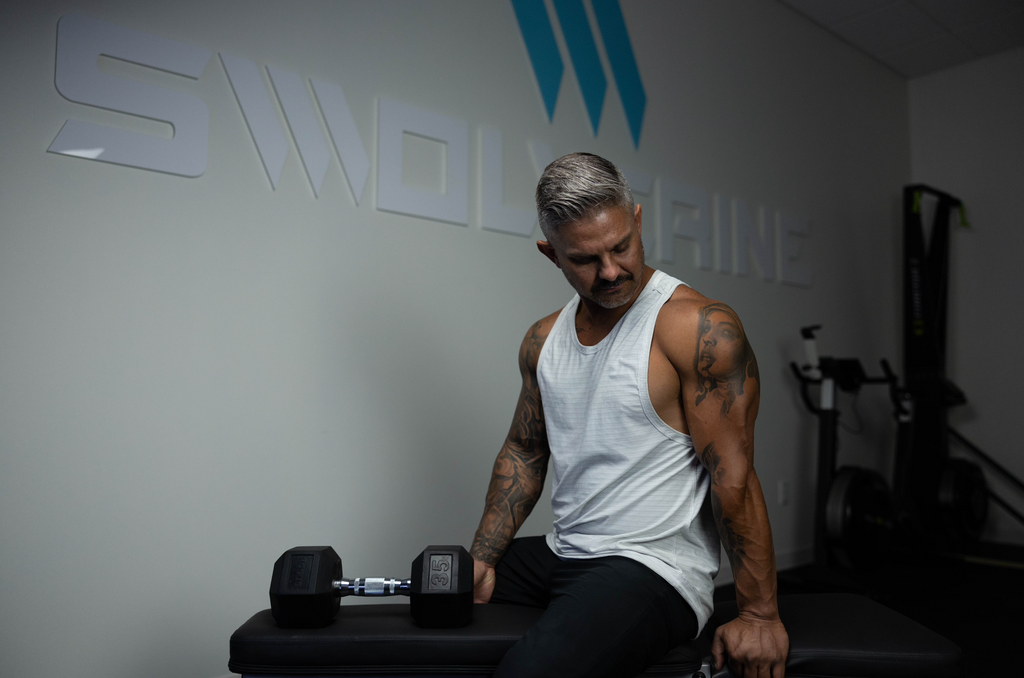Everything you need to know about Saturday’s global event in the Serbian capital of Belgrade, including an early look at the course
It feels like summer has arrived early in Belgrade. The Serbian capital’s Park of Friendship – the venue for this weekend’s World Cross Country Championships – is blooming with daisies and dandelions. A fresh wind rips across the fields from the nearby Danube and Sava rivers. Under blue skies, temperatures are pleasant and forecast to rise even further ahead of the races on Saturday.
As cross-country courses go, the Park of Friendship isn’t the most exciting. This sizeable area of grassland to the east of the city is fairly flat and featureless. World Athletics are hard at work this week, though, constructing various obstacles to make it more challenging for the athletes and spectator-friendly for fans.
Some of the competitors are already in the city, too, with runners from Australia, New Zealand and Japan getting an early taste of the course on Wednesday (March 27) after long flights to Europe. They are excited by the prospect of running what some still maintain is “the toughest race in the world”, an event where milers meet marathoners in a showdown to discover the best all-round runner on the planet.

Australian runners check out the course
Many of the other teams are due to arrive on Thursday. This includes a British squad which is proudly one of a small number of ever-present nations to attend every edition of the modern World Cross since it began in 1973. The five-strong list of “World Cross ever-presents” is down to just four countries this year, however, with GB, France, Spain and the United States maintaining their streak but Italy now joining the list of countries who choose to give this event a miss.
It is five years since Aarhus in Denmark staged what Seb Coe described as a “watershed moment”. The course was imaginative and picturesque, with runners racing up the grassy roof of a Viking museum, whereas there were large crowds thanks to mass races taking place alongside the elite events.
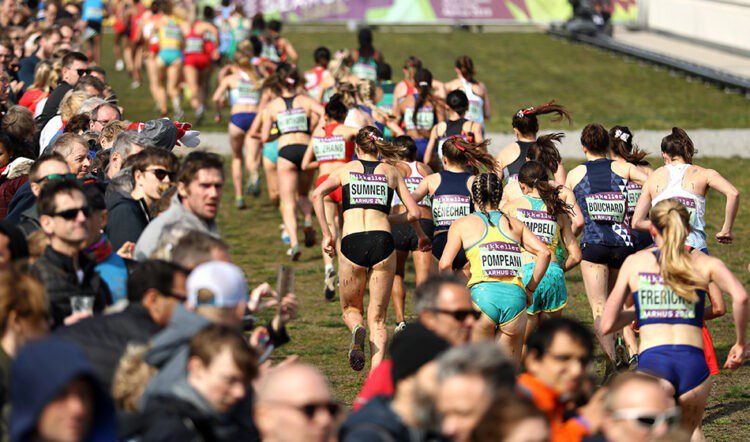
World Cross in Aarhus in 2019
After a Covid-enforced hiatus, Bathurst in Australia took up the baton in decent style with an enjoyable championship 12 months ago. Given this, Belgrade has a couple of tough acts to follow, but before rushing to judgement don’t forget this week’s venue is very much World Athletics’ plan B due to the original event – in Croatia in mid-February – being pulled because preparations were behind.
On Saturday we will see 245 athletes from 51 nations in action. It’s more than Bathurst saw last year but slightly down on Aarhus in 2019 and Kampala in 2017. Disappointingly, along with Italy there are further no-shows from nations like Germany, Belgium, Finland, Turkey and Switzerland, among others. The solitary Dutch entrant, Sifan Hassan, has withdrawn, which means there is no Netherlands, whereas Norway’s only competitor is three-time European champion Karoline Bjerkeli Grøvdal.
The busiest championships in history, incidentally, was Vilamoura in 2000 when 806 athletes from 76 nations took part. These included Derartu Tulu, Paula Radcliffe and a young Mo Farah. There were, it should be added, also short-course races back then but no mixed relay.
This is not to suggest that the 2024 line-ups will be poor. The senior races have still attracted many of the world’s top endurance runners and you can guarantee that several of the relatively unknown east Africans who make their mark in the under-20 races will go on to make Olympic podiums.

Belgrade 2013 (Mark Shearman)
So what can they expect on Saturday? The European Cross Country Championships was staged in the same Park of Friendship venue nine years ago (pictured above) and I wrote in AW at the time: “The Serbian capital put on a decent show … on a spectator-friendly course featuring firm ground, surprisingly mild temperatures (mid-December) and a random log that was barely a foot high designed to break the rhythm of runners on each of the 1500m laps.”

Sand-covered paths in Belgrade
When AW looked at the course on Wednesday, three days before the races, the surface was firm and dry in parts but some sections were more ‘turf-like’ with thicker grass. Some cycle and jogging lanes have been covered by sand (see above). Clearly, World Athletics were still working to complete certain sections too.

Hay maze in Belgrade
Some small bridges with a blue surface have been constructed to give the runners at least a couple of “hills” on each lap. There is also a “hay maze” for runners to either zig-zag through or, in some cases, perhaps hurdle. A small section of ground had also been dug up (see below), presumably to be filled with water on the eve of the race to create a short “mud obstacle”.
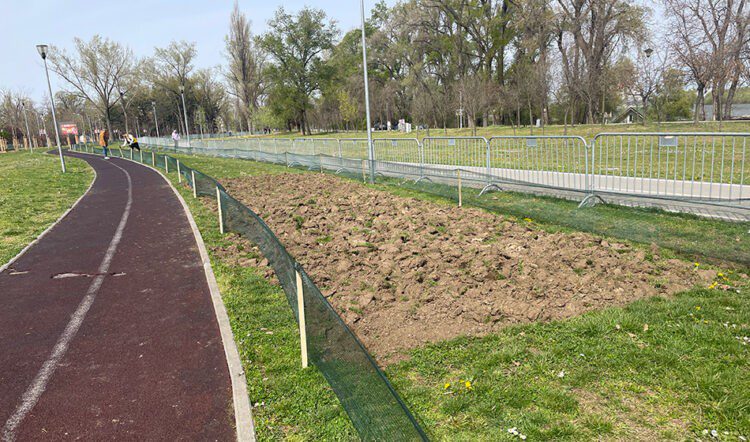
One part of the course has been described as the “treeline” with a number of small newly planted trees for runners to weave past. There are plans to have musical sections, too, whereas the sizeable finishing straight flanked by a tribune will see runners race toward the park’s Eternal Flame memorial.

Artificial hill in Belgrade
The athletes will also be racing in an historic setting as a number of trees in the Park of Friendship have been planted by royalty or political heads of state such as Queen Elizabeth II, Jimmy Carter, Fidel Castro, Richard Nixon and Indira Ghandi among others.

Most athletes will get their first taste of the course on Friday when the traditional walking – or in many cases running – of the course will take place. Elsewhere in the city, Seb Coe, the president of World Athletics, will front a press conference on Saturday along with athletes such as Grøvdal, reigning champions Beatrice Chebet of Kenya and Jacob Kiplimo of Uganda plus one of the Serbian athletes Elzan Bibic.

Treeline section
Kiplimo has his work cut out in his title defence in the senior men’s race as he faces Ugandan team-mate and 2019 champion Joshua Cheptegei together with last year’s runner-up Berihu Aregawi of Ethiopia. It should be a great race with Cheptegei winning the last three world 10,000m titles, Olympic 5000m gold and setting world 5000m and 10,000m records, whereas Kiplimo, the 2023 winner in Bathurst, is the world half-marathon record-holder.
Look out as well for world half-marathon champion Sabastian Sawe and last year’s world under-20 champion Ishmael Kipkirui, both from Kenya. Tadese Worku of Ethiopia should also feature along with Ethiopian trials winner and last year’s under-20 bronze medallist Boki Diriba.
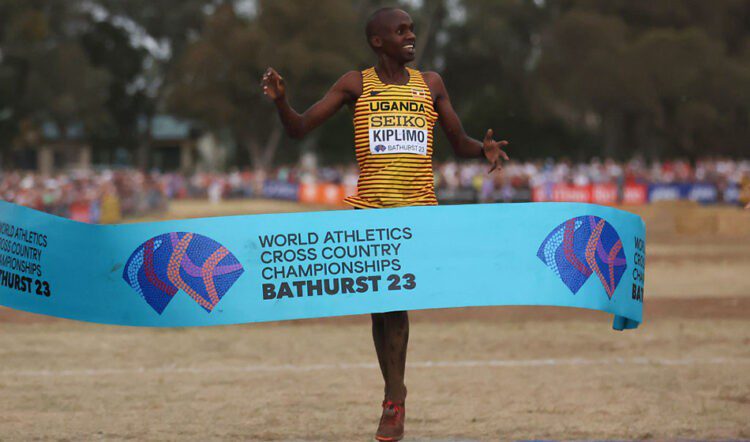
Jacob Kiplimo (Getty)
Chebet won a thrilling senior women’s race 12 months ago when she sprinter past a faltering Letesenbet Gidey. There is no Gidey this time but Chebet will have tough opposition from fellow Kenyans Agnes Ngetich, the bronze medallist from 2023, and Kenyan championships runner-up Emmaculate Anyango.
Since winning in Bathurst, Chebet has gone from strength to strength, too, with victory in the world 5km in Riga last October. The in-form Ngetich set a world 10km record with an astounding 28:46 in Valencia in January, though.
The Kenyan team also has Lilian Rengeruk and Margaret Chelimo Kipkemboi, both of whom took silver medals – at 5km and half marathon – in Riga last year.
Can the Ethiopians match the Kenyans in Belgrade? Their women’s team is led by Ethiopian trials winner Girmawit Gebrzihair and Amsterdam Marathon winner Tadelech Bekele.
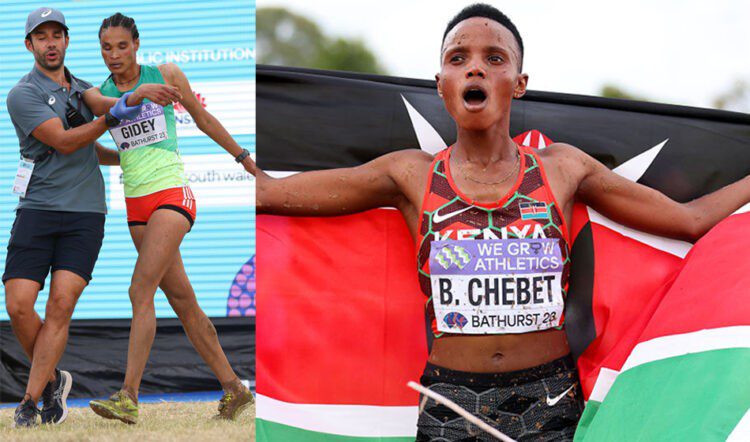
Beatrice Chebet wins as Gidey falls (Getty)
The under-20 races are notoriously hard to predict. The only thing that is certain is that runners from east Africa are certain to dominate.
The men’s race includes Kenyan trials winner Samuel Kibathi and African under-20 cross-country champion Gideon Kipngetich, also from Kenya, plus Abel Bekele of Ethiopia, who was seventh last year.
The under-20 women’s race, meanwhile, includes Ethiopia’s Lemlem Nibret, who finished fifth in Bathurst, together with Nancy Cherop of Kenya, but there will be much interest in how Innes FitzGerald, the European champion from Britain, fares against them.

Innes FitzGerald (Getty)
In the mixed relay, meanwhile, a Kenyan team that includes Emmanuel Wanyonyi, Reynold Cheruiyot and Purity Chepkirui will face an Ethiopian squad led by world 5km champion Hagos Gebrhiwet. Kenya won the inaugural title in 2017 and also last year in Bathurst whereas Ethiopia won in 2019.
Overall, Kenya will be aiming to maintain their supremacy over Ethiopia. Since 1973 the Kenyans have won 334 medals with Ethiopia totting up 285 and the United States 65.
The full British team is here although it does not include any race-week changes to the squad that might take place.
You can also read our pre-championship interviews with British team members…
Calum Johnson on why ditching triathlon for athletics is paying off – click here.
Adam Fogg looks back on his rollercoaster indoor season before racing the mixed relay in Belgrade – click here.
Alice Goodall talks about making her GB senior debut after winning European under-23 10,000m gold last year – click here.
Eliza Nicholson has gone from wanting to perform on the West End to now racing in the World Cross – click here.
More interviews will be appearing on our website and social media channels this week. Keep an eye on our online coverage here.

Timetable – Saturday March 30 (local times)
11am – women’s under-20 race
11.35am – men’s under-20 race
12.15pm – mixed relay
12.45pm – senior women’s race
13.30pm – senior men’s race
Serbia is one hour ahead of the UK, so the races will start 10am in Britain.
Many viewers should be able to see the races via the Eurovision Sport website or the World Athletics YouTube channel.
» Subscribe to AW magazine here





